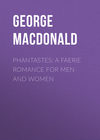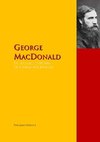Читать книгу: «David Elginbrod», страница 8
CHAPTER XV. TRANSITION
Tell me, bright boy, tell me, my golden lad, Whither away so frolic? Why so glad? What all thy wealth in council? all thy state? Are husks so dear? troth, ‘tis a mighty rate.
RICHARD CRASHAW
The long Scotch winter passed by without any interruption to the growing friendship. But the spring brought a change; and Hugh was separated from his friends sooner than he had anticipated, by more than six months. For his mother wrote to him in great distress, in consequence of a claim made upon her for some debt which his father had contracted, very probably for Hugh’s own sake. Hugh could not bear that any such should remain undischarged, or that his father’s name should not rest in peace as well as his body and soul. He requested, therefore, from the laird, the amount due to him, and despatched almost the whole of it for the liquidation of this debt, so that he was now as unprovided as before for the expenses of the coming winter at Aberdeen. But, about the same time, a fellow-student wrote to him with news of a situation for the summer, worth three times as much as his present one, and to be procured through his friend’s interest. Hugh having engaged himself to the laird only for the winter, although he had intended to stay till the commencement of the following session, felt that, although he would much rather remain where he was, he must not hesitate a moment to accept his friend’s offer; and therefore wrote at once.
I will not attempt to describe the parting. It was very quiet, but very solemn and sad. Janet showed far more distress than Margaret, for she wept outright. The tears stood in David’s eyes, as he grasped the youth’s hand in silence. Margaret was very pale; that was all. As soon as Hugh disappeared with her father, who was going to walk with him to the village through which the coach passed, she hurried away, and went to the fir-wood for comfort.
Hugh found his new situation in Perthshire very different from the last. The heads of the family being themselves a lady and a gentleman, he found himself a gentleman too. He had more to do, but his work left him plenty of leisure notwithstanding. A good portion of his spare time he devoted to verse-making, to which he felt a growing impulse; and whatever may have been the merit of his compositions, they did him intellectual good at least, if it were only through the process of their construction. He wrote to David after his arrival, telling him all about his new situation; and received in return a letter from Margaret, written at her father’s dictation. The mechanical part of letter-writing was rather laborious to David; but Margaret wrote well, in consequence of the number of papers, of one sort and another, which she had written for Hugh. Three or four letters more passed between them at lengthening intervals. Then they ceased—on Hugh’s side first; until, when on the point of leaving for Aberdeen, feeling somewhat conscience-stricken at not having written for so long, he scribbled a note to inform them of his approaching departure, promising to let them know his address as soon as he found himself settled. Will it be believed that the session went by without the redemption of this pledge? Surely he could not have felt, to any approximate degree, the amount of obligation he was under to his humble friends. Perhaps, indeed, he may have thought that the obligation was principally on their side; as it would have been, if intellectual assistance could outweigh heart-kindness, and spiritual impulse and enlightenment; for, unconsciously in a great measure to himself, he had learned from David to regard in a new and more real aspect, many of those truths which he had hitherto received as true, and which yet had till then produced in him no other than a feeling of the common-place and uninteresting at the best.
Besides this, and many cognate advantages, a thousand seeds of truth must have surely remained in his mind, dropped there from the same tongue of wisdom, and only waiting the friendly aid of a hard winter, breaking up the cold, selfish clods of clay, to share in the loveliness of a new spring, and be perfected in the beauty of a new summer.
However this may have been, it is certain that he forgot his old friends far more than he himself could have thought it possible he should; for, to make the best of it, youth is easily attracted and filled with the present show, and easily forgets that which, from distance in time or space, has no show to show. Spending his evenings in the midst of merry faces, and ready tongues fluent with the tones of jollity, if not always of wit, which glided sometimes into no too earnest discussion of the difficult subjects occupying their student hours; surrounded by the vapours of whisky-toddy, and the smoke of cutty pipes, till far into the short hours; then hurrying home, and lapsing into unrefreshing slumbers over intended study; or sitting up all night to prepare the tasks which had been neglected for a ball or an evening with Wilson, the great interpreter of Scottish song—it is hardly to be wondered at that he should lose the finer consciousness of higher powers and deeper feelings, not from any behaviour in itself wrong, but from the hurry, noise, and tumult in the streets of life, that, penetrating too deep into the house of life, dazed and stupefied the silent and lonely watcher in the chamber of conscience, far apart. He had no time to think or feel.
The session drew to a close. He eschewed all idleness; shut himself up, after class hours, with his books; ate little, studied hard, slept irregularly, working always best between midnight and two in the morning; carried the first honours in most of his classes; and at length breathed freely, but with a dizzy brain, and a face that revealed, in pale cheeks, and red, weary eyes, the results of an excess of mental labour—an excess which is as injurious as any other kind of intemperance, the moral degradation alone kept out of view. Proud of his success, he sat down and wrote a short note, with a simple statement of it, to David; hoping, in his secret mind, that he would attribute his previous silence to an absorption in study which had not existed before the end of the session was quite at hand. Now that he had more time for reflection, he could not bear the idea that that noble rustic face should look disapprovingly or, still worse, coldly upon him; and he could not help feeling as if the old ploughman had taken the place of his father, as the only man of whom he must stand in awe, and who had a right to reprove him. He did reprove him now, though unintentionally. For David was delighted at having such good news from him; and the uneasiness which he had felt, but never quite expressed, was almost swept away in the conclusion, that it was unreasonable to expect the young man to give his time to them both absent and present, especially when he had been occupied to such good purpose as this letter signified. So he was nearly at peace about him—though not quite. Hugh received from him the following letter in reply to his; dictated, as usual, to his secretary, Margaret:—
“MY DEAR SIR,
“Ye’ll be a great man some day, gin ye haud at it. But things maunna be gotten at the outlay o’ mair than they’re worth. Ye’ll ken what I mean. An’ there’s better things nor bein’ a great man, efter a’. Forgie the liberty I tak’ in remin’in’ ye o’ sic like. I’m only remin’in’ ye o’ what ye ken weel aneuch. But ye’re a brave lad, an’ ye hae been an unco frien’ to me an’ mine; an’ I pray the Lord to thank ye for me, for ye hae dune muckle guid to his bairns—meanin’ me an’ mine. It’s verra kin’ o’ ye to vrite till’s in the verra moment o’ victory; but weel ye kent that amid a’ yer frien’s—an’ ye canna fail to hae mony a ane, wi’ a head an’ a face like yours—there was na ane—na, no ane, that wad rejoice mair ower your success than Janet, or my doo, Maggie, or yer ain auld obleeged frien’ an’ servant,
“DAVID ELGINBROD
“P.S.—We’re a’ weel, an’ unco blythe at your letter.
“Maggy—
“P.S. 2.—Dear Mr. Sutherland,—I wrote all the above at my father’s dictation, and just as he said it, for I thought you would like his Scotch better than my English. My mother and I myself are rejoiced at the good news. My mother fairly grat outright. I gaed out to the tree where I met you first. I wonder sair sometimes if you was the angel I was to meet in the fir-wood. I am,
“Your obedient servant,
“MARGARET ELGINBROD.”
This letter certainly touched Hugh. But he could not help feeling rather offended that David should write to him in such a warning tone. He had never addressed him in this fashion when he saw him every day. Indeed, David could not very easily have spoken to him thus. But writing is a different thing; and men who are not much accustomed to use a pen, often assume a more solemn tone in doing so, as if it were a ceremony that required state. As for David, having been a little uneasy about Hugh, and not much afraid of offending him—for he did not know his weaknesses very thoroughly, and did not take into account the effect of the very falling away which he dreaded, in increasing in him pride, and that impatience of the gentlest reproof natural to every man—he felt considerably relieved after he had discharged his duty in this memento vivere. But one of the results, and a very unexpected one, was, that a yet longer period elapsed before Hugh wrote again to David. He meant to do so, and meant to do so; but, as often as the thought occurred to him, was checked both by consciousness and by pride. So much contributes, not the evil alone that is in us, but the good also sometimes, to hold us back from doing the thing we ought to do.
It now remained for Hugh to look about for some occupation. The state of his funds rendered immediate employment absolutely necessary; and as there was only one way in which he could earn money without yet further preparation, he must betake himself to that way, as he had done before, in the hope that it would lead to something better. At all events, it would give him time to look about him, and make up his mind for the future. Many a one, to whom the occupation of a tutor is far more irksome than it was to Hugh, is compelled to turn his acquirements to this immediate account; and, once going in this groove, can never get out of it again. But Hugh was hopeful enough to think, that his reputation at the university would stand him in some stead; and, however much he would have disliked the thought of being a tutor all his days, occupying a kind of neutral territory between the position of a gentleman and that of a menial, he had enough of strong Saxon good sense to prevent him, despite his Highland pride, from seeing any great hardship in labouring still for a little while, as he had laboured hitherto. But he hoped to find a situation more desirable than either of those he had occupied before; and, with this expectation, looked towards the South, as most Scotchmen do, indulging the national impulse to spoil the Egyptians. Nor did he look long, sending his tentacles afloat in every direction, before he heard, through means of a college friend, of just such a situation as he wanted, in the family of a gentleman of fortune in the county of Surrey, not much more than twenty miles from London. This he was fortunate enough to obtain without difficulty.
Margaret was likewise on the eve of a change. She stood like a young fledged bird on the edge of the nest, ready to take its first long flight. It was necessary that she should do something for herself, not so much from the compulsion of immediate circumstances, as in prospect of the future. Her father was not an old man, but at best he could leave only a trifle at his death; and if Janet outlived him, she would probably require all that, and what labour she would then be capable of as well, to support herself. Margaret was anxious, too, though not to be independent, yet, not to be burdensome. Both David and Janet saw that, by her peculiar tastes and habits, she had separated herself so far from the circle around her, that she could never hope to be quite comfortable in that neighbourhood. It was not that by any means she despised or refused the labours common to the young women of the country; but, all things considered, they thought that something more suitable for her might be procured.
The laird’s lady continued to behave to her in the most supercilious fashion. The very day of Hugh’s departure, she had chanced to meet Margaret walking alone with a book, this time unopened, in her hand. Mrs. Glasford stopped. Margaret stopped too, expecting to be addressed. The lady looked at her, all over, from head to foot, as if critically examining the appearance of an animal she thought of purchasing; then, without a word, but with a contemptuous toss of the head, passed on, leaving poor Margaret both angry and ashamed.
But David was much respected by the gentry of the neighbourhood, with whom his position, as the laird’s steward, brought him not unfrequently into contact; and to several of them he mentioned his desire of finding some situation for Margaret. Janet could not bear the idea of her lady-bairn leaving them, to encounter the world alone; but David, though he could not help sometimes feeling a similar pang, was able to take to himself hearty comfort from the thought, that if there was any safety for her in her father’s house, there could not be less in her heavenly Father’s, in any nook of which she was as full in His eye, and as near His heart, as in their own cottage. He felt that anxiety in this case, as in every other, would just be a lack of confidence in God, to suppose which justifiable would be equivalent to saying that He had not fixed the foundations of the earth that it should not be moved; that He was not the Lord of Life, nor the Father of His children; in short, that a sparrow could fall to the ground without Him, and that the hairs of our head are not numbered. Janet admitted all this, but sighed nevertheless. So did David too, at times; for he knew that the sparrow must fall; that many a divine truth is hard to learn, all-blessed as it is when learned; and that sorrow and suffering must come to Margaret, ere she could be fashioned into the perfection of a child of the kingdom. Still, she was as safe abroad as at home.
An elderly lady of fortune was on a visit to one of the families in the neighbourhood. She was in want of a lady’s-maid, and it occurred to the housekeeper that Margaret might suit her. This was not quite what her parents would have chosen, but they allowed her to go and see the lady. Margaret was delighted with the benevolent-looking gentlewoman; and she, on her part, was quite charmed with Margaret. It was true she knew nothing of the duties of the office; but the present maid, who was leaving on the best of terms, would soon initiate her into its mysteries. And David and Janet were so much pleased with Margaret’s account of the interview, that David himself went to see the lady. The sight of him only increased her desire to have Margaret, whom she said she would treat like a daughter, if only she were half as good as she looked. Before David left her, the matter was arranged; and within a month, Margaret was borne in her mistress’s carriage, away from father and mother and cottage-home.
END OF THE FIRST BOOK
BOOK II. ARNSTEAD
The earth hath bubbles as the water has
MACBETH.—I.3
CHAPTER I. A NEW HOME
A wise man’s home is whereso’er he’s wise.
JOHN MARSTON.—Antonio’s Revenge.
Hugh left the North dead in the arms of grey winter, and found his new abode already alive in the breath of the west wind. As he walked up the avenue to the house, he felt that the buds were breaking all about, though, the night being dark and cloudy, the green shadows of the coming spring were invisible.
He was received at the hall-door, and shown to his room, by an old, apparently confidential, and certainly important butler; whose importance, however, was inoffensive, as founded, to all appearance, on a sense of family and not of personal dignity. Refreshment was then brought him, with the message that, as it was late, Mr. Arnold would defer the pleasure of meeting him till the morning at breakfast.
Left to himself, Hugh began to look around him. Everything suggested a contrast between his present position and that which he had first occupied about the same time of the year at Turriepuffit. He was in an old handsome room of dark wainscot, furnished like a library, with book-cases about the walls. One of them, with glass doors, had an ancient escritoire underneath, which was open, and evidently left empty for his use. A fire was burning cheerfully in an old high grate; but its light, though assisted by that of two wax candles on the table, failed to show the outlines of the room, it was so large and dark. The ceiling was rather low in proportion, and a huge beam crossed it. At one end, an open door revealed a room beyond, likewise lighted with fire and candles. Entering, he found this to be an equally old-fashioned bedroom, to which his luggage had been already conveyed.
“As far as creature comforts go,” thought Hugh, “I have fallen on my feet.” He rang the bell, had the tray removed, and then proceeded to examine the book-cases. He found them to contain much of the literature with which he was most desirous of making an acquaintance. A few books of the day were interspersed. The sense of having good companions in the authors around him, added greatly to his feeling of comfort; and he retired for the night filled with pleasant anticipations of his sojourn at Arnstead. All the night, however, his dreams were of wind and snow, and Margaret out in them alone. Janet was waiting in the cottage for him to bring her home. He had found her, but could not move her; for the spirit of the storm had frozen her to ice, and she was heavy as a marble statue.
When he awoke, the shadows of boughs and budding twigs were waving in changeful network-tracery, across the bright sunshine on his window-curtains. Before he was called he was ready to go down; and to amuse himself till breakfast-time, he proceeded to make another survey of the books. He concluded that these must be a colony from the mother-library; and also that the room must, notwithstanding, be intended for his especial occupation, seeing his bedroom opened out of it. Next, he looked from all the windows, to discover into what kind of a furrow on the face of the old earth he had fallen. All he could see was trees and trees. But oh! how different from the sombre, dark, changeless fir-wood at Turriepuffit! whose trees looked small and shrunken in his memory, beside this glory of boughs, breaking out into their prophecy of an infinite greenery at hand. His rooms seemed to occupy the end of a small wing at the back of the house, as well as he could judge. His sitting-room windows looked across a small space to another wing; and the windows of his bedroom, which were at right-angles to those of the former, looked full into what seemed an ordered ancient forest of gracious trees of all kinds, coming almost close to the very windows. They were the trees which had been throwing their shadows on these windows for two or three hours of the silent spring sunlight, at once so liquid and so dazzling. Then he resolved to test his faculty for discovery, by seeing whether he could find his way to the breakfast-room without a guide. In this he would have succeeded without much difficulty, for it opened from the main-entrance hall, to which the huge square-turned oak staircase, by which he had ascended, led; had it not been for the somewhat intricate nature of the passages leading from the wing in which his rooms were (evidently an older and more retired portion of the house) to the main staircase itself. After opening many doors and finding no thoroughfare, he became convinced that, in place of finding a way on, he had lost the way back. At length he came to a small stair, which led him down to a single door. This he opened, and straightway found himself in the library, a long, low, silent-looking room, every foot of the walls of which was occupied with books in varied and rich bindings. The lozenge-paned windows, with thick stone mullions, were much overgrown with ivy, throwing a cool green shadowiness into the room. One of them, however, had been altered to a more modern taste, and opened with folding-doors upon a few steps, descending into an old-fashioned, terraced garden. To approach this window he had to pass a table, lying on which he saw a paper with verses on it, evidently in a woman’s hand, and apparently just written, for the ink of the corrective scores still glittered. Just as he reached the window, which stood open, a lady had almost gained it from the other side, coming up the steps from the garden. She gave a slight start when she saw him, looked away, and as instantly glanced towards him again. Then approaching him through the window, for he had retreated to allow her to enter, she bowed with a kind of studied ease, and a slight shade of something French in her manner. Her voice was very pleasing, almost bewitching; yet had, at the same time, something assumed, if not affected, in the tone. All this was discoverable, or rather spiritually palpable, in the two words she said—merely, “Mr. Sutherland?” interrogatively. Hugh bowed, and said:
“I am very glad you have found me, for I had quite lost myself. I doubt whether I should ever have reached the breakfast-room.”
“Come this way,” she rejoined.
As they passed the table on which the verses lay, she stopped and slipped them into a writing-case. Leading him through a succession of handsome, evidently modern passages, she brought him across the main hall to the breakfast-room, which looked in the opposite direction to the library, namely, to the front of the house. She rang the bell; the urn was brought in; and she proceeded at once to make the tea; which she did well, rising in Hugh’s estimation thereby. Before he had time, however, to make his private remarks on her exterior, or his conjectures on her position in the family, Mr. Arnold entered the room, with a slow, somewhat dignified step, and a dull outlook of grey eyes from a grey head well-balanced on a tall, rather slender frame. The lady rose, and, addressing him as uncle, bade him good morning; a greeting which he returned cordially, with a kiss on her forehead. Then accosting Hugh, with a manner which seemed the more polite and cold after the tone in which he had spoken to his niece, he bade him welcome to Arnstead.
“I trust you were properly attended to last night, Mr. Sutherland? Your pupil wanted very much to sit up till you arrived, but he is altogether too delicate, I am sorry to say, for late hours, though he has an unfortunate preference for them himself. Jacob,” (to the man in waiting), “is not Master Harry up yet?”
Master Harry’s entrance at that moment rendered reply unnecessary.
“Good morning, Euphra,” he said to the lady, and kissed her on the cheek.
“Good morning, dear,” was the reply, accompanied by a pretence of returning the kiss. But she smiled with a kind of confectionary sweetness on him; and, dropping an additional lump of sugar into his tea at the same moment, placed it for him beside herself; while he went and shook hands with his father, and then glancing shyly up at Hugh from a pair of large dark eyes, put his hand in his, and smiled, revealing teeth of a pearly whiteness. The lips, however, did not contrast them sufficiently, being pale and thin, with indication of suffering in their tremulous lines. Taking his place at table, he trifled with his breakfast; and after making pretence of eating for a while, asked Euphra if he might go. She giving him leave, he hastened away.
Mr. Arnold took advantage of his retreat to explain to Hugh what he expected of him with regard to the boy.
“How old would you take Harry to be, Mr. Sutherland?”
“I should say about twelve from his size,” replied Hugh; “but from his evident bad health, and intelligent expression—”
“Ah! you perceive the state he is in,” interrupted Mr. Arnold, with some sadness in his voice. “You are right; he is nearly fifteen. He has not grown half-an-inch in the last twelve months.”
“Perhaps that is better than growing too fast,” said Hugh.
“Perhaps—perhaps; we will hope so. But I cannot help being uneasy about him. He reads too much, and I have not yet been able to help it; for he seems miserable, and without any object in life, if I compel him to leave his books.”
“Perhaps we can manage to get over that in a little while.”
“Besides,” Mr. Arnold went on, paying no attention to what Hugh said, “I can get him to take no exercise. He does not even care for riding. I bought him a second pony a month ago, and he has not been twice on its back yet.”
Hugh could not help thinking that to increase the supply was not always the best mode of increasing the demand; and that one who would not ride the first pony, would hardly be likely to ride the second. Mr. Arnold concluded with the words:
“I don’t want to stop the boy’s reading, but I can’t have him a milksop.”
“Will you let me manage him as I please, Mr. Arnold?” Hugh ventured to say.
Mr. Arnold looked full at him, with a very slight but quite manifest expression of surprise; and Hugh was aware that the eyes of the lady, called by the boy Euphra, were likewise fixed upon him penetratingly. As if he were then for the first time struck by the manly development of Hugh’s frame, Mr. Arnold answered:
“I don’t want you to overdo it, either. You cannot make a muscular Christian of him.” (The speaker smiled at his own imagined wit.) “The boy has talents, and I want him to use them.”
“I will do my best for him both ways,” answered Hugh, “if you will trust me. For my part, I think the only way is to make the operation of the intellectual tendency on the one side, reveal to the boy himself his deficiency on the other. This once done, all will be well.”
As he said this, Hugh caught sight of a cloudy, inscrutable dissatisfaction slightly contracting the eyebrows of the lady. Mr. Arnold, however, seemed not to be altogether displeased.
“Well,” he answered, “I have my plans; but let us see first what you can do with yours. If they fail, perhaps you will oblige me by trying mine.”
This was said with the decisive politeness of one who is accustomed to have his own way, and fully intends to have it—every word as articulate and deliberate as organs of speech could make it. But he seemed at the same time somewhat impressed by Hugh, and not unwilling to yield.
Throughout the conversation, the lady had said nothing, but had sat watching, or rather scrutinizing, Hugh’s countenance, with a far keener and more frequent glance than, I presume, he was at all aware of. Whether or not she was satisfied with her conclusions, she allowed no sign to disclose; but, breakfast being over, rose and withdrew, turning, however, at the door, and saying:
“When you please, Mr. Sutherland, I shall be glad to show you what Harry has been doing with me; for till now I have been his only tutor.”
“Thank you,” replied Hugh; “but for some time we shall be quite independent of school-books. Perhaps we may require none at all. He can read, I presume, fairly well?”
“Reading is not only his forte but his fault,” replied Mr. Arnold; while Euphra, fixing one more piercing look upon him, withdrew.
“Yes,” responded Hugh; “but a boy may shuffle through a book very quickly, and have no such accurate perceptions of even the mere words, as to be able to read aloud intelligibly.”
How little this applied to Harry, Hugh was soon to learn.
“Well, you know best about these things, I daresay. I leave it to you. With such testimonials as you have, Mr. Sutherland, I can hardly be wrong in letting you try your own plans with him. Now, I must bid you good morning. You will, in all probability, find Harry in the library.”
Покупайте книги и получайте бонусы в Литрес, Читай-городе и Буквоеде.
Участвовать в бонусной программе




















